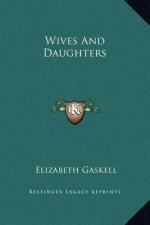’Bless the child! one would think I was a hungry pussy-cat, and she a hen-sparrow, with her wings all fluttering, and her little eyes aflame, and her beak ready to peck me just because I happened to look near her nest. Nay, child! if thou lik’st to be stifled in a nasty close room, learning things as is of no earthly good when they is learnt, instead o’ riding on Job Donkin’s hay-cart, it’s thy look-out, not mine. She’s a little vixen, isn’t she?’ smiling at Miss Eyre, as she finished her speech. But the poor governess saw no humour in the affair; the comparison of Molly to a hen-sparrow was lost upon her. She was sensitive and conscientious, and knew, from home experience, the evils of an ungovernable temper. So she began to reprove Molly for giving way to her passion, and the child thought it hard to be blamed for what she considered her just anger against Betty. But, after all, these were the small grievances of a very happy childhood.
CHAPTER IV
MR GIBSON’S NEIGHBOURS
Molly grew up among these quiet people in calm monotony of life, without any greater event than that which has been recorded,—the being left behind at the Towers, until she was nearly seventeen. She had become a visitor at the school, but she had never gone again to the annual festival at the great house; it was easy to find some excuse for keeping away, and the recollection of that day was not a pleasant one on the whole, though she often thought how much she should like to see the gardens again.
Lady Agnes was married; there was only Lady Harriet remaining at home; Lord Hollingford, the eldest son, had lost his wife, and was a good deal more at the Towers since he had become a widower. He was a tall ungainly man, considered to be as proud as his mother, the countess; but, in fact, he was only shy, and slow at making commonplace speeches. He did not know what to say to people whose daily habits and




